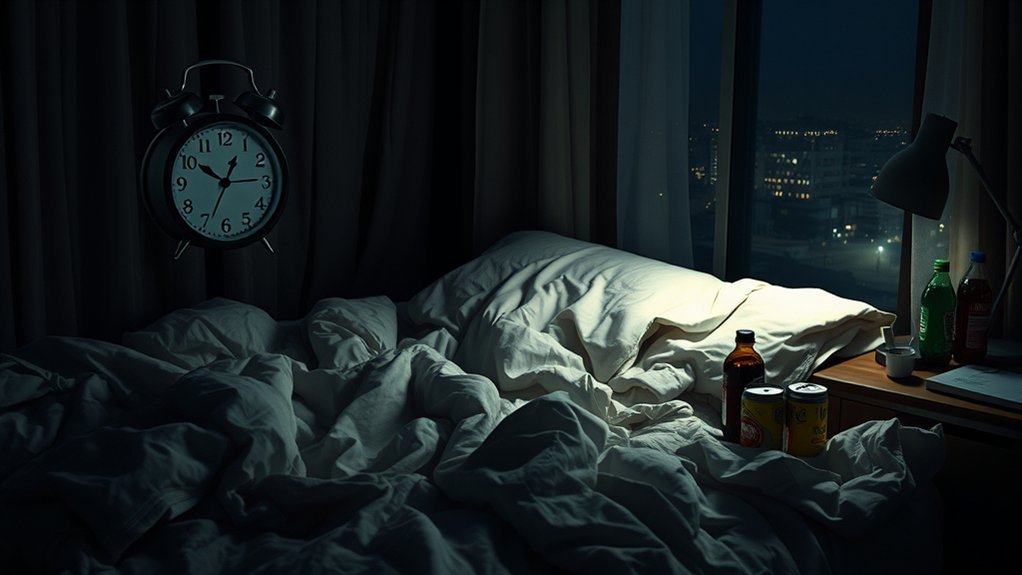Imagine waking up each day feeling more drained than the last. This pervasive issue of sleep deprivation isn’t just about feeling tired; it greatly affects your mood, leading to irritability, anxiety, and even depression. Understanding the root causes—like stress and poor sleep habits—can help you regain control. What if recognizing these patterns could transform your emotional well-being? Exploring these connections may hold the key to better mental health.
Understanding Sleep Deprivation
When you don’t get enough sleep, the effects on your body and mind can be profound. Sleep deprivation disrupts your brain’s ability to function effectively, impairing cognitive processes like attention, decision-making, and emotional regulation.
Research shows that a lack of sleep can heighten feelings of irritability and anxiety, making it harder to cope with daily stressors. You might find that your mood swings become more frequent, and you may struggle to maintain relationships due to increased frustration.
Additionally, chronic sleep deprivation can lead to long-term mental health issues, including depression. Understanding these effects is vital; it emphasizes the importance of prioritizing sleep for your overall well-being and mood stability.
Common Causes of Sleep Deprivation
Recognizing the effects of sleep deprivation highlights the need to understand its common causes. By identifying these factors, you can take steps to improve your sleep quality.
Understanding sleep deprivation’s impact is crucial for identifying its causes and enhancing your overall sleep quality.
Here are four common causes:
- Stress and Anxiety: Life’s pressures can keep your mind racing, making it hard to fall asleep.
- Poor Sleep Hygiene: Irregular sleep schedules, excessive screen time, and uncomfortable sleep environments can disrupt your rest.
- Medical Conditions: Issues like sleep apnea, chronic pain, or hormonal imbalances can greatly affect your ability to sleep well.
- Substance Use: Caffeine, nicotine, and alcohol can interfere with your sleep cycles, leading to fragmented sleep.
Understanding these causes empowers you to make informed changes, paving the way for better sleep and overall well-being.
The Impact of Sleep Deprivation on Mood
Sleep deprivation greatly impacts your mood, often leading to irritability, anxiety, and even depression.
Studies show that a lack of sleep disrupts the brain’s emotional regulation, making you more reactive to stressors. When you’re sleep-deprived, your ability to process emotions diminishes, causing feelings of sadness and frustration to intensify. You might also notice that small annoyances become overwhelming, affecting your relationships and daily interactions.
Additionally, chronic sleep deprivation can alter the balance of neurotransmitters, further exacerbating mood disorders. Recognizing these effects is vital; by addressing your sleep needs, you can improve not just your mood but your overall well-being.
Prioritizing rest is essential for emotional resilience and mental clarity in your daily life.
Risk Factors Contributing to Sleep Issues
Numerous factors can contribute to sleep issues, often compounding the effects of mood disturbances caused by sleep deprivation.
Recognizing these risk factors can help you understand your sleep patterns better:
- Stress: High levels of stress can trigger insomnia, making it harder for you to fall or stay asleep.
- Lifestyle Choices: Poor diet, lack of exercise, and excessive screen time can negatively impact your sleep quality.
- Mental Health: Conditions like anxiety and depression can disrupt your sleep cycle, leading to chronic sleep problems.
- Substance Use: Caffeine, nicotine, and alcohol can interfere with your ability to get restful sleep.
Strategies for Improving Sleep Quality
When you prioritize good sleep hygiene, you can greatly improve your overall sleep quality and, in turn, enhance your mood.
Start by establishing a consistent sleep schedule; going to bed and waking up at the same time daily reinforces your body’s natural rhythm.
Create a calming bedtime routine—activities like reading or gentle stretching can signal your brain that it’s time to wind down.
Limit exposure to screens at least an hour before sleep; blue light disrupts melatonin production, which is essential for sleep onset.
Additionally, consider your sleep environment—keep your bedroom dark, cool, and quiet to promote restful sleep.
Finally, be mindful of caffeine and alcohol intake; both can considerably disrupt your sleep cycles and affect your mood the next day.
Frequently Asked Questions
How Does Sleep Deprivation Affect Cognitive Function?
Sleep deprivation greatly impairs your cognitive function, affecting attention, memory, and decision-making. You might struggle with problem-solving and experience slower reaction times, which can hinder daily tasks and overall performance in both personal and professional settings.
What Are the Long-Term Effects of Chronic Sleep Deprivation?
If you consistently miss sleep, you might face heightened anxiety and chronic health issues like heart disease. Studies show long-term deprivation can impair memory, increase stress, and weaken your immune response, impacting your overall well-being considerably.
Can Sleep Deprivation Lead to Physical Health Issues?
Yes, sleep deprivation can lead to various physical health issues, including cardiovascular diseases, obesity, and weakened immune function. Prioritizing sleep is essential for your overall well-being and long-term health. Don’t underestimate its importance.
How Does Age Influence Sleep Deprivation Effects?
Age considerably influences how sleep deprivation affects you. Younger individuals often experience heightened irritability, while older adults may struggle with cognitive decline. Understanding these differences can help you address your sleep needs more effectively.
Are Certain Professions More Prone to Sleep Deprivation?
Yes, certain professions, like healthcare, transportation, and emergency services, often require irregular hours, leading to increased sleep deprivation. You might find it challenging to maintain a healthy sleep routine, affecting both your mood and performance.
Conclusion
To sum up, if you’re struggling with sleep deprivation, know you’re not alone. The interplay between mood and sleep is complex, yet understanding its causes can empower you to reclaim restful nights. Imagine waking up refreshed, with a clearer mind and a brighter outlook. By addressing risk factors and adopting healthier sleep habits, you can break the cycle of poor sleep and emotional turmoil. The path to better sleep—and a better mood—awaits; will you take the first step?
